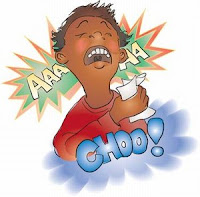Fighting the Common Cold in Babies
 |
| Click for image source |
What causes common cold?
Studies have reported that there are more than 200 different
cold viruses. The most common virus
causing colds are rhinovirus in all age groups. It has been found that by the
age of 5 years, virtually all children have been exposed to one or the other
cold virus.
How do I know it is common cold
The symptoms of a common cold are seen after about 10-12
hours of a viral infection while an influenza virus may take 1 to 7 days to
appear as symptoms. The mean duration of a common cold is 7 to 10 days in
children but in younger children it may last longer.
The most common symptoms of common cold in babies and
children are;
1.
Runny nose (watery discharge at first, which
later becomes thicker and yellowish)
2.
Sneezing
3.
Nasal congestion
Symptoms which may be associated with a complication of common cold are;
1.
Dry cough worsening when the baby lies down
2.
Fever
3.
Itchy throat
4.
Fatigue
5.
Loss of appetite
Complications of common cold
The symptoms of common cold may persist in some children
even after 3 weeks. The most common complications arising as a result of cold
are acute otitis media occurring in almost 20% of children with viral upper
respiratory infections.
The viral infection may also affect the middle ear fluid and
cause an inflammation in the mucosa of the middle ear. Bronchitis, pneumonia or
sinusitis are certain other complications associated with cold.
Doctor's problem
The biggest problem associated with the cold in infants and
younger children is that they cannot express their symptoms. Diagnosis in
infants is especially difficult when fever is the major symptom during the
early phase of the infection and the doctor is faced with the difficulty of
distinguishing viral infections from severe bacterial infections.
Treatment of common cold
There are no known cures for common cold, but symptoms can
be treated to provide relief to the baby or the young child. The treatment that
has been recommended for common cold in babies and young children are;
1.
Suctioning of mucus with a suction bulb. Over
the counter saline nasal drops may be used to soften the hard mucus before the
suctioning of mucus. This will help the baby to feed properly and sleep well.
2.
Keep the air in the room humidified to moisten
the air, reduce congestion and facilitate breathing in the babies.
 |
| Click for Image source |
4.
Petroleum jelly or similar ointment should be
applied lightly to the outside of and under nose to prevent chapping and
reddening of the skin.
5.
Decongestants prescribed by the physician are
given to ease congestion so that the baby can eat and sleep properly.
6.
Nose drops are given after being prescribed the
doctor to ease the congestion. Overuse may lead to a rebound reaction and
worsen the condition of the baby.
7.
Cough medicine may be prescribed by the doctor
to ease a dry cough in extreme cases. But, generally cough suppressants are not
prescribed for the babies. American Academy of Pediatrics cautions against the
use of any cough medicines in infants and children. Antibiotics should be used
only in case of secondary bacterial infection.
8.
The baby should be isolated from others in the
family for the initial three days to prevent spreading of the cold to others.
9.
Dietary changes: baby should be continued on
normal diet. The intake of milk and other dairy products may be reduced as
these can thicken the secretions. Fluid intake should be increased to replenish
the lost fluids. Vitamin C rich foods should be given to the baby.
Red alert!
Mostly, children cope well with cold but there are instances where immediate intervention of the doctor becomes inevitable. Rush your baby to the doctor in any of these conditions;
1.
If this is
a first cold of your baby
2.
If your baby is under 3 months or 4 months of
age and has a fever over 101˚F
3.
If the temperature suddenly goes up or stays for
more than 2 days
4.
A dry cough lasting for more than 2 weeks or
interfering with the baby’s sleep, causes choking or vomiting, becomes thick
and productive or wheezy
5.
A cough lasting for more than three weeks in an
infant or six in an older baby
6.
If breathing difficulties develop
7.
If a thick greenish yellow nasal discharge
develops lasting for more than a day
8.
If the nasal discharge is streaked with blood
9.
Unusual amount of crying or loss of appetite


Comments
Post a Comment
Please leave your comments.
Also, tell us what would you like to read about!